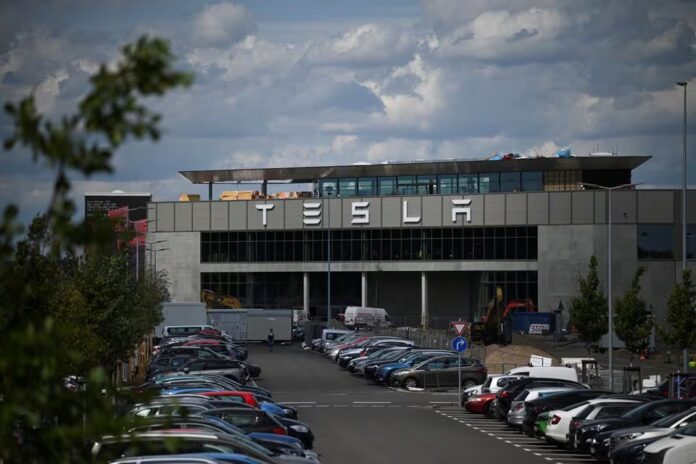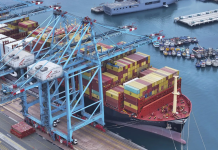BERLIN:Tesla announced on Thursday that it would temporarily halt the majority of car production at its Berlin-based factory from January 29 to February 11. The company attributed this decision to a shortage of components, which has been caused by changes in transportation routes due to attacks on ships in the Red Sea.
This partial production halt is a clear indication that the crisis in the Red Sea is impacting Europe’s largest economy. The crisis was triggered by Houthi militants, backed by Iran, launching attacks on vessels in support of the Palestinian Islamist group Hamas, which is currently engaged in conflict with Israel in Gaza.
Tesla, the US electric vehicle manufacturer, is the first to announce a disruption in production due to the ongoing crisis. This interruption is a result of a shortage of components caused by changes in transportation routes following attacks on vessels in the Red Sea. Other companies, including Geely, China’s second-largest automaker by sales, and Swedish home furnishing company Ikea, have also warned of potential delivery delays.
Tesla stated that the armed conflicts in the Red Sea and the subsequent alterations in transport routes between Europe and Asia via the Cape of Good Hope are affecting production in Gruenheide. This situation underscores the far-reaching impacts of geopolitical conflicts on global supply chains and manufacturing processes.
“The extended transportation times are leading to disruptions in supply chains.”
There is an expectation among analysts that other car manufacturers could also be impacted by the conflict in the Red Sea.
“Dependence on a multitude of key components from Asia, particularly China, has always been a potential vulnerability in any car manufacturer’s supply chain. Tesla, for instance, relies significantly on China for battery components. These components need to be shipped to Europe via the Red Sea, which constantly exposes production to risk,” stated Sam Fiorani, Vice President at Auto Forecast Solutions, a company that monitors automotive supply chains and production.
“It’s hard to believe they’re the only ones affected, they’re just the first to acknowledge the issue,” he said.
This disruption comes at a challenging time for Tesla, as it is currently embroiled in a labour dispute with the Swedish trade union IF Metall over the signing of a collective bargaining agreement. This dispute has triggered sympathy strikes from numerous unions across the Nordic region.
Unionized workers at Hydro Extrusions, a subsidiary of the Norwegian aluminium and energy company Hydro, ceased work on components for Tesla car products on November 24. These workers are members of IF Metall.
Tesla has yet to comment on whether the strike at Hydro Extrusions is impacting its production.
In a statement released on Thursday, the company announced that full production would resume on February 12. However, it did not provide further details on which components were missing or how it plans to restore production by that date.
The attacks carried out by Iranian-backed Houthi militants have compelled the world’s leading shipping companies to avoid the Suez Canal. This canal is the quickest maritime route from Asia to Europe and accounts for approximately 12% of global maritime traffic.
Shipping giants such as Maersk (MAERSKb.CO) and Hapag-Lloyd (HLAG.DE) have been sending their vessels on longer, more expensive journeys around South Africa’s Cape of Good Hope.
Denmark’s Maersk said on Friday it expects the rerouting to last for the foreseeable future.
The extra route adds about 10 days in a journey from Asia to Northern Europe and about $1 million in extra fuel.
Across the electric vehicle sector, carmakers and analysts in Europe have warned in recent months that sales were not growing as fast as hoped, with some companies cutting prices in an attempt to boost demand weighed down by economic uncertainty.

Shipping giants such as Maersk (MAERSKb.CO) and Hapag-Lloyd (HLAG.DE) have been sending their vessels on longer, more expensive journeys around South Africa’s Cape of Good Hope.
Denmark’s Maersk said on Friday it expects the rerouting to last for the foreseeable future.
The extra route adds about 10 days in a journey from Asia to Northern Europe and about $1 million in extra fuel.
Across the electric vehicle sector, carmakers and analysts in Europe have warned in recent months that sales were not growing as fast as hoped, with some companies cutting prices in an attempt to boost demand weighed down by economic uncertainty.






